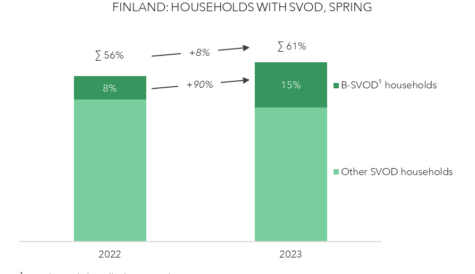
After more than 40 years of operation, DTVE is closing its doors and our website will no longer be updated daily. Thank you for all of your support.
AVOD viewers are older and from lower income households, says report
A distinct difference is emerging between audiences of ad-supported and subscription VOD services, a new report claims.
According to a new report from Ampere Analysis, despite ostensibly serving the same purpose – i.e. entertainment video delivery – the two platform types are not competing for the same audience.
The report notes that active AVOD users tend to be older – 44% of AVOD users are aged 45-64 vs 36% of SVOD users falling into this category – and from lower income households. In the US, half of all AVOD users have a household income of less than US$30,000 per year compared to a third of SVOD users, while almost one in five AVOD viewers have a household income of less than US$15,000 per year.
This is unsurprising given the premium nature of services like Netflix, Hulu and HBO Max which are only increasing in cost as time goes by.
Fox-owned Tubi, which has a catalogue of more than 29,000 titles (five times as many movies as Netflix), is leading the charge for AVODs according to Ampere, though other platforms like ViacomCBS’s Pluto TV and NBCUniversal’s recently launched hybrid A/SVOD Peacock are also growing in size.
Overall, 17% of US internet users used one or more AVOD services in Q3 – up from 13% in Q3 2019.
From a revenue standpoint, Ampere says that while major AVOD platforms are still nascent, their backing from major tech and media companies should withstand any current pressures and that Covid-19-linked ad-demand issues will not be a fundamental issue for the groups.
Minal Modha, consumer research lead from Ampere Analysis said: “With distinct audiences, we believe that these two offerings aren’t competing directly with each other but rather can coexist. We have seen some companies offer both a free and paid-for tier, such as Amazon’s Prime and IMDb TV, Hulu and NBC’s Peacock.
“In the current climate with both economic uncertainty and a greater need for people to stay at home, we expect the use of AVoD services to continue to rise as more consumers will be turning to these platforms as they seek entertainment without increasing their financial outlay.”



